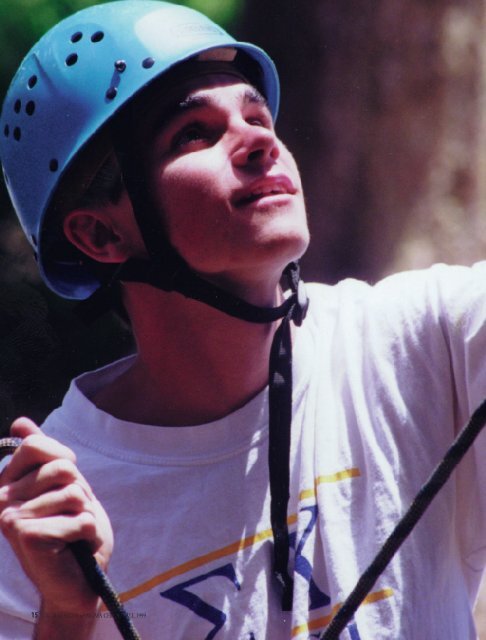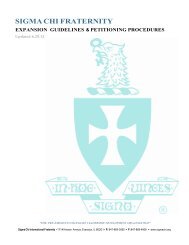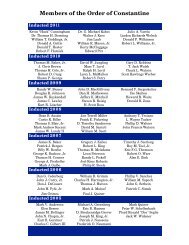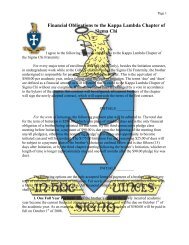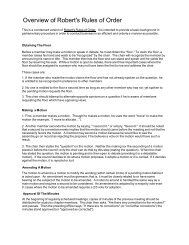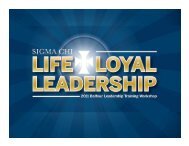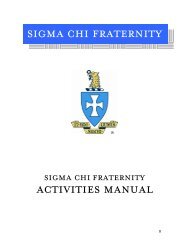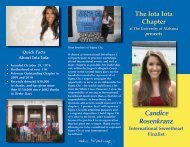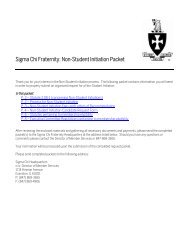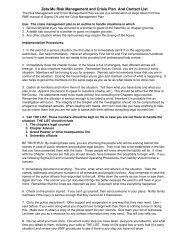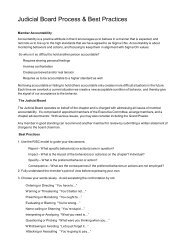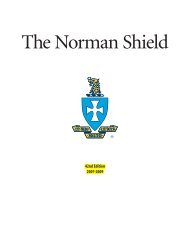We are all explorers - Sigma Chi Fraternity
We are all explorers - Sigma Chi Fraternity
We are all explorers - Sigma Chi Fraternity
You also want an ePaper? Increase the reach of your titles
YUMPU automatically turns print PDFs into web optimized ePapers that Google loves.
15 The MAGAZINE of SIGMA CHI • FALL 1999
Dick Hester, B<strong>all</strong> State 1977, to select and manage facilitators;Grand Praetor Michael Greenberg, Illinois <strong>We</strong>sleyan 1982, tomanage marketing and communications; Cory Rigler, Montana1998, to oversee quality control; and James Cole, Purdue 1997,to handle the <strong>We</strong>b site and Snowbird site logistics. Added to thisgroup was the Foundation’s director of education Erik Ness,North Carolina State 1996, to serve as the Foundation liaison.Next, Greene and Piotti created the curriculum committee, agroup they knew would serve as the core of the Horizons experience.They chose: Past International Balfour winner Jeff Casper,Utah 1997; Past Grand Consul Chuck Thatcher, Michigan 1943;John Hensel, Southeast Missouri State 1986; Erik Ness; and,later, Charles Nies, Washington State 1998; and Grand ProConsul Doug Carlson, Minnesota 1973.In January 1998, Greene and his entire crew traveled to<strong>Chi</strong>cago to meet for the first time. “Every single brother I invitedto be there showed up,” Greene rec<strong>all</strong>s. “These brothers cameto work. [They had] a clean sheet of paper and no guarantee ofwhere we were going—that was a very moving first stage.”Bringing in the outsidersA wise person once said that if you’re able to know what you donot know, you know a lot. The Horizons crew, in one particulardecision, showed that it knew a great deal: that it couldn’t pulloff an event of this scope by itself.“<strong>We</strong> had determined from the beginning that we, in ourown infinite wisdom, might think we have the ability and theacademic training to develop a program such as this,” Greeneadmits. “But for <strong>all</strong> the right reasons, we accepted the fact that ifwe were re<strong>all</strong>y embarking on something that is truly designed tohave a built-in learning experience, we did not have the expertiseto do that.”Greene says that at that stage their mind-set was, “If we wantprofessional work, let’s go to a professional.” They understoodthat there were questions—“How do these young people learn?How do they absorb? How do they retain?”—to which they didnot know the answers. “For one of the first times, we broke themold and accepted the fact that within <strong>Sigma</strong> <strong>Chi</strong>, we’ve gotsome super talent, but we needed to take it to another level.”To attain that level, the committee went after outside consultinggroups. After interviewing four separate companies, Greeneand the committee chose Footprints Consulting and Training, a12-year-old company founded and run by Elaine P<strong>all</strong>adino.“Footprints put together a rather dramatic proposal thatsounded much closer to the services we were looking for [thanthe other proposals],” Greene says. “After meeting with Elaine,it became obvious that her values and principles and ultimateobjectives were directly in harmony with ours. It was uncanny.”The match was one P<strong>all</strong>adino enjoyed as well. “From myunderstanding, they were looking for a group that was eager to“There’s nothing like this—anywhere.”On the final full day of Horizons, The Magazine spoke with Mike Eberlein,Minnesota 2000 ( below, right) to get a first-hand reaction to the program.ME: It was interesting because you can relate the program to some campus involvementwhere everyone is on the same level, because you’re <strong>all</strong> in college. For us, it was a bit differentbecause we were <strong>all</strong> in the same situation—<strong>all</strong> having quite a bit of school left. Whatwas unique about meeting seven new guys and a facilitator was that we <strong>all</strong> had somethinga little bit deeper, in the Ritual, and there was an immediate trust for each other, an immediatebond, that re<strong>all</strong>y <strong>all</strong>owed us to be more cohesive re<strong>all</strong>y, re<strong>all</strong>y early in the week. <strong>We</strong>could talk about anything in our lives and get to know each other in a matter of 24 to 48hours, whereas, in your chapter, it would take a whole semester.MAG: Did some of the other guys sh<strong>are</strong> your anticipation and interest inthe curriculum?ME: Absolutely. There were guys who sat back and watched a little bit, to begin with. Therewas definitely a sm<strong>all</strong>er group of guys who stepped up right away to take on the leadershiproles. But everyone got involved, everyone participated. The communication, especi<strong>all</strong>ywithin our group, was effective from the start. There was no sense of [anyone] holding back.Everyone was very open and honest.MAG: What did you expect out of this experience?ME: My expectations were probably a little bit different, because I had subtle hints from ourGrand Pro Consul as I was accepted into the program. The excitement started to build as Ihad been getting c<strong>all</strong>s from my facilitator and talking with Doug [Carlson] and other alumniwho had been involved with this project for two years.But as far as the curriculum, no one knew what was going to happen. <strong>We</strong> <strong>all</strong> camehere on the same level. It was hard coming here on Monday morning not knowing whatto expect. There was a little bit of hesitation, and a little bit of anticipation. But as the weekwore on, the first few days built an incredible foundation for what was to come. Those dayswere definitely more guided toward learning and talking and giving us a base knowledgefor what to apply in the later days; those days <strong>are</strong> more hands-on.MAG: What was it like to meet <strong>all</strong> of those other guys who didn’t knowwhat was going on either? What did you guys talk about?MAG: What was your biggest surprise of the week?ME: [Pause] Umm, the whole week was a surprise. It’s hard to put my finger on one thing.MAG: Did you surprise yourself at <strong>all</strong>?ME: I did. I think everyone surprised themselves. Mostly what I surprised myself with wasrealizing that I have so much more to give. Because I’m going to be a senior, I’m a littleunique—I’m a little older, but I still have two years left in <strong>Sigma</strong> <strong>Chi</strong>. But, coming into mysenior year, it’s time for the sophomores and juniors to step up. It was a re<strong>all</strong>y drastic realizationthat this [learning process] isn’t over for a [long time]. My expectations for myself forgoing on [Headquarters] staff within a couple years [and] providing for the <strong>Fraternity</strong> havebeen just endless here. It’s incredible to think that in a matter of three years I could be herefacilitating, or coming on staff, or taking pictures for The Magazine, or whatever. And rightnow, I’m here at the inaugural Horizons. It’s incredible. It’s re<strong>all</strong>y cool.MAG: What do you think it’s going to be like to leave here?ME: It’s sad. I still think it’s <strong>We</strong>dnesday. The last half of the week went so fast. I think16 The MAGAZINE of SIGMA CHI • FALL 1999
push the envelope in terms of the kinds of creative things thatwere possible,” she says, “and one that understood how to workwith individuals in an outdoor environment.”P<strong>all</strong>adino says that what Footprints does best is state-of-theartinstruction and adventure-based learning. Her company hascreated programs for companies as large as Dow Chemical andHonda, but it has also dealt with non-profit and church organizations.“<strong>We</strong> <strong>are</strong> a very value-based organization,” she explains,“and many of our values <strong>are</strong> absolutely aligned with the <strong>Sigma</strong><strong>Chi</strong> values.”For this project, P<strong>all</strong>adino brought on board Ron McInnes,whose consulting firm, Horizons Consulting, has provided organizationaldevelopment and leadership and management developmentto companies for more than 10 years.In much the same way the <strong>Fraternity</strong> and Foundation haveteamed up for progress, the Oversight Committee and P<strong>all</strong>adinoand McInnes jumped in to work together. Curriculum chairmanJohn Piotti c<strong>all</strong>s the teamwork “critical,” though he notes it c<strong>all</strong>edfor work on both sides. “At first, I’m not sure the consultantsknew what to make of us,” he says. “As professional trainers, theyspend a lot of time helping corporate clients learn about collaboration,and here we were, so collaborative, that I suspect—atfirst—they thought we didn’t have a chance of ever agreeing on abold action plan.”But, Piotti continues, the necessary changes occurred. “Astime went on, they adapted to us and we learned from them inwhat proved a truly synergistic experience.”This teamwork between the Sigs and the consultants wasat its most vital in designing the Horizons curriculum. “TheCurriculum Committee started with a clean slate,” chairmanPiotti remembers. “<strong>We</strong> weren’t given any guidelines except thatthe program—whatever it was to be—should focus on youngerundergraduates.”In terms of focus, the committee began by thinking abouttheir ultimate goals. John Piotti says that the question they cameback to was, “What change did we want to see in the attitudesand behaviors of the participants?”“It soon became clear,” Piotti says, “that what we were re<strong>all</strong>yafter was helping the participants develop their full potential asmembers of society. <strong>We</strong> found ourselves focusing on the developmentof one’s character far more than on leadership skills.”Piotti continues: “Early on, even before Horizons had a nameor we had thought through any of the curriculum, the committeemade some decisions about the program’s ‘look’ and ‘feel.’ <strong>We</strong>wanted the program to be primarily experiential, to offer directfeedback, to provide time for reflection, and to push participantsto think differently about themselves and their world. Beyond <strong>all</strong>that, we wanted a program that was grounded upon <strong>Sigma</strong> <strong>Chi</strong>’score values.”But what about…that leaving here will be unique from an LTW, or from a Grand Council, or from an[Undergraduate Interfraternity Institute], or any other leadership institute, in that I know thecommunication between participants is going to be higher than any other institute or program.The communication between the facilitator and participant is going to be in the samemanner. It’s re<strong>all</strong>y hard to describe in words. I just kind of know that it is. I think, one, we’reyounger—so we have more time left in the chapter. <strong>We</strong>’re <strong>all</strong> going to need each other’ssupport and question each other’s leadership styles and contact each other in times of need.MAG: What do you think it will be like to go back to a chapter full of peoplewho don’t know anything about this program?ME: <strong>We</strong>ll, it’s going to be hard not to brag. That’s the first thing that you want to do whenyou come back from something like this. You’re so high on <strong>Sigma</strong> <strong>Chi</strong> that immediatelyyou want to go back and tell everyone about it. But I think that part of the uniqueness ofHorizons is that we didn’t know anything going into it. So it’s going to be hard to go backand tell everyone about it. I think it will be easier for me to tell the guys in my class because,unfortunately, they will never have the opportunity to come to this.I think the approach I’ll take is that when I go back to the house, with the pledges comingin and the recent initiates, I’ll hopefully be able to take a few of them under my wing,and start to give back what <strong>Sigma</strong> <strong>Chi</strong> and Horizons have given me. I’ve had three, four,five or even ten [young men I’ve mentored], in just two years, and I think it’s time for meto bring this back and let them know about it and encourage them to apply. I think it’ll bere<strong>all</strong>y hard at the first chapter meeting to explain about my Horizons experience, because Icould talk for hours and hours and hours.MAG: How did you explain to family and others what you were doing outhere? And also, how will you explain it afterwards?ME: Yeah, I think the question is better, ‘How will I explain it when I get back?’ Becausewhen I go back to work, and get back to school, and I’m taping <strong>all</strong> this stuff on my w<strong>all</strong>s,and I’ve got a pyramid in my office, people <strong>are</strong> going to be like, ‘What’s this stuff?’ And I’llsay, ‘That’s what I did, in the middle of the summer, 1999, I went to Horizons.’ And hopefullythey’ll be interested enough to ask me what we learned, and I’ll be able to explain tothem the uniqueness of Horizons—in that you’re learning something here that is so applicable,and you’re taking so many tools back, both physical and mental, that you can applyto your everyday life. There’s nothing like this—anywhere. If <strong>all</strong> I can do is explain to thepeople that what we’re trying to do here is benefit the world, and if we can do it one weekat a time, and 50 brothers at a time, and maybe if I can get through to just one of thoseguys, then I think I’ve done my part.MAG: Do you have one moment, or one activity or experience that’s a highlightfor this week?ME: <strong>We</strong>ll, I re<strong>all</strong>y thought the situation with [facilitator] Sandy [Thompson] was cool. Heblew his knee out, and his team was there for him completely. I think it’s unique not thatthey just stopped what they were doing to give him unending assistance, but the fact thathe decided to postpone surgery and come back to be a part of this whole unit.And it’s re<strong>all</strong>y special because it’s not just his team or Sandy that it affected, but itaffected everyone here. Everyone saw that, and everyone learned something. It’s ironic thatit happened at that time, when we’re learning so much about leadership and perseverance,that everyone didn’t want to continue [the final day’s activity], because we’re <strong>all</strong> a team,and part of the team was missing. And it <strong>all</strong> worked out in the end, and he came back [to bepart of] a cohesive unit.MAG: What <strong>are</strong> you expecting tonight?ME: Tonight? <strong>We</strong>ll, I suppose after Ritual wrap-up, dinner, speaker, I think it’s time torelax—to celebrate brotherhood respectably. I know that there will be a lot of emotionsflying tonight. Emotional good-byes and pictures <strong>are</strong> always fun at the end of the week. Italways seems like you have the best conversations there at the end, when you fin<strong>all</strong>y havethe guts to walk up to that guy and say, ‘You know, I completely respect you, and what youdid in that situation was tot<strong>all</strong>y awesome.’ And you leave with just an absolutely incrediblehigh. And you take <strong>all</strong> that energy back in your chapter, and hope that you can put itto some use. Maybe it’s one pledge, maybe it’s the whole pledge class, but if so, then thisexperience is a complete success.FALL 1999 • The MAGAZINE of SIGMA CHI 17
There were still more choices to make. Where should this eventbe held? Who should be invited? The first question was answeredin what Jeff Greene c<strong>all</strong>s a “synergistic accident.” The committee,having decided that it wanted a location that would offera favorable mid-summer climate and a mountainous, rigorousenvironment, zeroed in on Denver and Salt Lake City. In Springof 1998, then-director of conference services C.J. McAdams,Tennessee Tech 1995, finished a series of site visits in Salt Lakeand began driving back to the airport. On the way, he saw asign for the Snowbird Resort and decided to stop in. “It was acomplete cold c<strong>all</strong>,” Greene says. After learning of the beautyand services the resort offered—and discovering that Snowbird’smanaging director of sales and marketing, Larry Jackstien, Utah1967, was a <strong>Sigma</strong> <strong>Chi</strong> willing and interested in hosting theevent—it was an easy decision to make.The committee knew that it wanted Horizons to be centeredaround younger undergraduates, but it still needed to makedecisions on numbers. The group ultimately decided on 48attendees and six facilitators, providing a ratio that was in linewith the desired sense of intimacy. But that still left one importantquestion: would the students pay to attend?“<strong>We</strong> had a sizable debate about this one,” Jeff Greeneexplains. “There were those on one side who said, ‘People tend tosupport what they invest in, so they might be more committed.’But there were those on the other side who said, ‘Hey, we’re askingthese guys to give up a full seven days in the middle of theirsummer when most of them will be working—is it fair to askthem to pay a tuition?”The committee eventu<strong>all</strong>y decided against a Horizons tuition.Greene explains that since Horizons is not a chapter-sponsoredevent, it should not be expected that a chapter pay for a delegateto attend. Also, he says, the committee worried that by charginga tuition it might exclude brothers with a ch<strong>all</strong>enging financialsituation.Foundation board member Jim Morris notes that althoughthe decision had already been made to accept only those brotherswith two or more years of school left—so that they canreturn to their college and practice what they’ve learned—theactual choosing of applicants would be one of their “majorhurdles.” The ch<strong>all</strong>enge, he says, was in “how to, in a very dignifiedway, recruit people who were a combination of alreadyestablished young leaders and people who were potential leadersbut haven’t yet had a chance to show that true leadership.”Morris continues: “<strong>We</strong> re<strong>all</strong>y wanted a diversified group ofpeople were because that’s what the real world is made up of.”For Morris, Horizons would not be a break from the realworld , but a concentrated slice of it. “<strong>We</strong> <strong>are</strong> a microcosm ofwhat these people <strong>are</strong> going to encounter throughout collegeThe Oversight BoardJames Cole, Purdue 1997Michael Greenberg, Illinois <strong>We</strong>sleyan 1982Jeff Greene,Wyoming 1975Dick Hester, B<strong>all</strong> State 1977Erik Ness, North Carolina State 1996John Piotti, MIT 1983Cory Rigler, Montana 1998FacilitatorsGlen Berree, Florida Southern 1969Tom Hutton, Virginia Tech 1983Jock Murray, Kentucky 1982Charles Nies, Washington State 1987Brad Nihls, Purdue 1999Sandy Thomson, Denison 1959Key playersDoug Carlson, Minnesota 1973John Hensel, Southeast Missouri St. 1986Buddy Metcalf, Auburn 1969Jim Morris, Minnesota 1949Frank Raymond, Penn State 1971Chuck Thatcher, Michigan 1943Who was there?AttendeesJason Allman, South Carolina 2002Tony Alv<strong>are</strong>z, Oregon State 2001David Bankston, San Jose State 2001Ryan Barlow, Brown 2001Brian Black, Saint Louis 2001Kenneth Blair, Denver 2001R. B. Brandvold, Idaho 2002Matt Carpenter, Kansas State 2002Jeffrey Desing, Butler 2001Ryan Downing, Iowa State 2003Erik Dunki-Jacobs, Rochester 2001Michael Eberlein, Minnesota 2001Christopher Feller, Bowling Green State 2001Ryan Flynn, Iowa State 2001Robert Foote III, Emory 2001Scott Furakawa, Willamette 2001Kurtis Fusaro, Ohio <strong>We</strong>sleyan 2001Derek Glos, Willamette 2001Larrry Grant, Florida Southern 2001Sean Harvey, Willamette 2001Andrew Hayes, Idaho 2002Nathan Heinrich, North Dakota State 2002Larry Ho, British Columbia 2001Scott Hustis, Virginia Tech 2001David Kasch, Loyola Marymount 2001Timothy Krueger, Butler 2001Russell Lake, College Of Charleston 2001Oren Matteson, Denver 2001Brian O’M<strong>all</strong>ey, Pennsylvania 2001Kirk Overhoff, Texas-Austin 2001Justin Parrock, Youngstown State 2001Richard Perez, Miami 2001Eric Pogue, <strong>We</strong>stern Michigan 2001David Pykett, Valparaiso 2001Timothy Richmond, <strong>We</strong>stern Connecticut St.2001Jay Rizzi, Tennessee Tech 2001-02Bill Robinson, Mississippi 2001Paul Romero, San Jose State 2001Harsh Singh, Wabash College 2001Nate Smith, Cal-San Diego 2001Phillip Smith, Tenn/Chatt 2001J<strong>are</strong>d Tennant, Southwest Texas State 2001Jeff Tolonen, California Poly-Pomona 2001Daniel Trapp, Valparaiso 2001Jonathan Urban, Indiana 2001Matthew Walters, Florida Southern 2001Kent White, East Tennessee State 2001Jacob Williams, San Jose State 2001ConsultantsElaine P<strong>all</strong>adinoEmily LangdonRon McInnesSpeakersBill George, Georgia Tech 1964Keith Krach, Purdue 1979Hugh Pinnock, Utah 1958How to apply:Applications for the Horizons 2000were mailed to <strong>all</strong> undergraduatechapters this past October. Thecompleted applications <strong>are</strong> dueto Headquarters (Attn. Erik Ness)by February 1, 2000.For more information, you mayvisit http://undergrad.sigmachi.organd click the Horizons link.18 The MAGAZINE of SIGMA CHI • FALL 1999
and as they go out into the world,” he says. “This whole idea oftrying to reflect and represent reality is what we strive for.”The question they didn’t want to askThere had been years of planning, a large amount of moneyinvested, hundreds and hundreds of pages of curriculumdesigned, but one question still lingered: Would anyone apply?The applications were mailed to chapters in November 1998,and director of education Erik Ness remembers waiting a bitnervously for the completed applications to show up. “Wheneveryou work on a new, innovative program,” he explains, “youknow it’s a good program, but you still wonder how well youtransferred that enthusiasm and knowledge into a three-pagebrochure.”The completed applications did arrive, in December andJanuary, and the attendee-selection committee settled in toreview them. The process wasn’t easy. As Jeff Greene says, theapplications were “outstanding,” containing impressive achievements,inspiring personal essays, and evident potential that justneeded to be tapped. But Greene says that the process itself wasa defining moment, because it meant that the program was onestep closer to taking place. “Students,” he says, “with little informationof the program stepped up and said, ‘Sign me up! I wantto be a part of this!”There <strong>are</strong> things we can’t tell youIn March 1999, 48 young <strong>Sigma</strong> <strong>Chi</strong>s were accepted intoHorizons. From their home chapters, they waited to receive overstuffedpackets of introductory information, explaining in detailwhat they would be doing for those full six days. Those packetsnever arrived.What these attendees did find out was where they needed tobe, how they should get there, and what was covered financi<strong>all</strong>y.The Horizons committee and the consultants had made a firmdecision that if they wanted to retain the purity and the chargeof the planned Horizons experience, they need not let the youngmen in on the plan. The days must be discovered on their own.Remembering John Piotti’s day-one exclamation to theattendees, “<strong>We</strong> <strong>are</strong> <strong>all</strong> <strong>explorers</strong>,” this writer must be selective inwhat he can reveal. Just as the 48 young men learned the detailsof their daily missions only when confronted with them face toface, future attendees must have the opportunity to do the same.Their experiences should not be watered down with explanationhere. That reading is for tourists; Horizons is for travelers.There <strong>are</strong> things we can tell youThe 48 young men changed that week. Here <strong>are</strong> a few reasonswhy:My Horizons experience by facilitator Glen Berree, Florida Southern 1969As I boarded the Delta flight for Salt Lake City,with my ultimate destination Snowbird, Utah, Ifelt an overwhelming sense of excitement. I hadbeen there only a month before to train as oneof six facilitators for a unique pilot program onleadership development created by my fraternity,<strong>Sigma</strong> <strong>Chi</strong>. Two of the 48 undergraduatesselected (from over 225 <strong>Sigma</strong> <strong>Chi</strong> chaptersnationwide) were members of my chapter,Epsilon <strong>Sigma</strong> at Florida Southern. Knowingthe quality of each of these young men madethe trip even more special for me. Javan Grant,the chapter’s president, and Matt Walters, thechapter’s vice president, were both selected toattend. Their impending six day experience isc<strong>all</strong>ed the Horizons Leadership Program.I had worked in <strong>are</strong>as of leadershipdevelopment and implementation for over 25years during my service in the U.S. Navy. Forthe past five years I had served as a trainerand facilitator with <strong>Sigma</strong> <strong>Chi</strong>'s internationalBalfour Leadership Training Workshop (LTW),the largest and most comprehensive of its kindin the Greek world. In <strong>all</strong> of my involvement,I have never witnessed any type of leadershiptraining that exceeds the Horizons experience.Where as the LTW's purpose is to give <strong>Sigma</strong><strong>Chi</strong> undergraduates holding positions of responsibilityin their respective chapters guidance onhow to improve their fraternity through moreenlightened leadership, the Horizons programhas a much wider focus.Horizons is a one-week program stressingthe development of character as the foundationof effective leadership. Although often linkingto the values that the <strong>Fraternity</strong> holds dear,Horizons participants explore the core valuesand leadership principles common to <strong>all</strong> greatleaders and why these virtues and principleshave such impact on enduring leadership. Theylook at how their own values play a significantrole in what kind of person and leader they willbe. Fin<strong>all</strong>y, each Horizons facilitator mentorsthe eight young men in his group for the nexttwo years, helping them with chapter problemsand leadership ch<strong>all</strong>enges in other <strong>are</strong>as of theirlives.Many international Greek leaders believethis is the next step for fraternities and sororitiesas we head into the 21st century. Greek organizationshave always been great laboratoriesfor human relations, <strong>all</strong>owing their membersto hone leadership skills that would serve themwell in college and throughout life. But overtime, society at large has lost a little of thatbasic component that was paramount in thelives of our fathers and grandfathers, that ofCHARACTER. Honesty, loyalty, integrity, dutyand personal responsibility were not just words,but uncompromising values that membersof their generation lived every day. Although<strong>Sigma</strong> <strong>Chi</strong>'s legacy and principles <strong>are</strong> based onstrong values, as I believe is the case with mostGreek organizations, their deepest meaning issometimes lost in the fog of collegiate life.Horizons serves to provide a midcourseguidance, or re-calibration of life's compass,for young men who <strong>are</strong> in the midst of sortingout what's truly important in life. Reinforcingthe valuable lessons of character and values, inconjunction with enduring leadership principles,will ultimately serve to make each <strong>Sigma</strong> <strong>Chi</strong>a more valuable member of society. This is aworthy goal for any fraternity or sorority.<strong>Sigma</strong> <strong>Chi</strong> members with at least twoyears left in their undergraduate experience<strong>are</strong> eligible to apply to attend Horizons. Allexpenses, including airf<strong>are</strong>, <strong>are</strong> completely paidby the fraternity for those chosen.The curriculum is anything but boring,encompassing the principles of whole person,interactive learning. In no way just relying onexperts transmitting their knowledge and experienceto students who passively listen, Horizonsparticipants <strong>are</strong> engaged in thinking, seeing,hearing, talking, doing, reflecting and tryingnew behaviors, <strong>all</strong> in an idyllic, mountainoussetting. The Horizon's pilot program was such asuccess, <strong>Sigma</strong> <strong>Chi</strong> is attempting to increase thenumbers selected to attend each summer from48 to 128 beginning in the summer of 2000.The college experience is enhanced byfraternities and sororities only if,by joining, thereis value added to the life of each of its members.The goal is to make good men and womenbetter, able leaders with strong character anda sense of their own values. This is where my<strong>Fraternity</strong>, and I believe the Greek world, isheading. I am proud to be part of the journey.FALL 1999 • The MAGAZINE of SIGMA CHI 19
They went on missions: On these missions, they learned newskills, worked as groups, relied on themselves, overcame fears,ch<strong>all</strong>enged systems, identified problems, created solutions.They wrote in their travel journals: From the photographs inthese pages, it may appear that Horizons is more of a physicaljourney than a mental one. Not so. The young men spent a largeamount of the week writing in their journals and reflecting onnew ideas and experiences.The journals represent what is so remarkable aboutHorizons: the meeting of the <strong>Sigma</strong> <strong>Chi</strong> world with the non-<strong>Sigma</strong> <strong>Chi</strong> world. Like Horizons, the journals make use of the<strong>Sigma</strong> <strong>Chi</strong> connection, with quotes from h<strong>all</strong>owed <strong>Fraternity</strong>leaders like William Lockwood and Benjamin Runkle. However,the pages move beyond the <strong>Sigma</strong> <strong>Chi</strong> world to offer ideas aboutLeonardo DaVinci, speeches from Nelson Mandela, and poetryfrom William Wordsworth.The philosophy seems to be this: only after confronting thesegeneral human truths and ideas can our <strong>Fraternity</strong> men begin to20 The MAGAZINE of SIGMA CHI • FALL 1999


